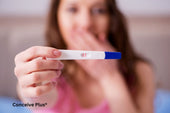How do I get my wife pregnant? Steps to help your partner conceive

When starting a family, many people ask, "How do I get my wife pregnant?" While conception may seem straightforward, understanding the science of fertility and adopting strategies to enhance your chances can make the journey smoother. This guide explores the factors that affect conception, tips for improving fertility, and addresses common misconceptions such as whether both partners need to climax for pregnancy.
Understanding the Basics of Conception
Conception occurs when sperm fertilizes an egg, leading to pregnancy. Here’s a brief overview of the process:
- Ovulation: The female body releases an egg from the ovary, typically around day 14 of a 28-day menstrual cycle. This egg is viable for about 24 hours.[1]
- Sperm Journey: Once ejaculated, sperm travel through the cervix into the uterus and fallopian tubes. Sperm can live inside the female reproductive system for up to five days.[2]
- Fertilization: If sperm reaches the egg during its viability window, fertilization can occur. The fertilized egg then implants into the uterine lining, leading to pregnancy.
Knowing your wife’s ovulation cycle is essential for timing intercourse to coincide with her fertile window, which significantly increases the likelihood of conception.
Maximizing Your Chances of Conception
To enhance fertility and increase the odds of pregnancy, consider these strategies:
Track Ovulation
- Use ovulation predictor kits (OPKs), basal body temperature (BBT) charts, or monitor changes in cervical mucus to pinpoint the most fertile days in your wife’s cycle.
- Aim for intercourse every 1-2 days during the fertile window, typically the five days leading up to ovulation and the day of ovulation itself.
Maintain a Healthy Lifestyle
- For Both Partners: A balanced diet rich in vitamins, minerals, and antioxidants can improve sperm and egg health.
- For Men: Foods rich in zinc, selenium, and omega-3 fatty acids can boost sperm quality and motility.[3]
- For Women: Folic acid supplements and foods high in vitamin D, calcium, and iron support overall reproductive health.
- Lifestyle: Regular exercise, adequate sleep, and stress management also play a role in optimizing fertility.
Consider Sperm Health
- Avoid smoking, excessive alcohol, and recreational drugs, as these can lower sperm count and quality.
- Avoid prolonged heat exposure to the testicles, such as from hot baths or tight underwear.
Intercourse and Fertility
One common question is, "Is it necessary for both partners to discharge for pregnancy?" The answer is no. While female climax can enhance sperm movement by creating contractions in the uterus, it is not required for conception. Male ejaculation, however, is essential to deliver sperm to the egg.
Myths and Misconceptions About Getting Pregnant
Many misconceptions can create unnecessary stress during the conception journey. Here are some clarified facts:
- Climax Myths: As mentioned, the female orgasm is not necessary for conception, though it may improve the chances slightly by aiding sperm movement.
- Positioning: There’s no scientific evidence that certain sexual positions guarantee pregnancy, but positions that allow for deeper penetration, like missionary, may place sperm closer to the cervix.
- Leg Elevation: While some believe elevating legs after intercourse helps, sperm are already programmed to swim toward the egg, making this unnecessary.
When to Seek Medical Advice
If conception does not occur after one year of regular, unprotected intercourse (or six months if the wife is over 35), it’s time to consult a fertility specialist. Both partners should undergo evaluations to identify any underlying issues.
Common male factors include low sperm count, poor motility, or structural abnormalities, while female factors could involve ovulatory disorders, blocked fallopian tubes, or hormonal imbalances. Treatments such as medications, lifestyle changes, or assisted reproductive technologies like IVF can address these issues.
Emotional Considerations in the Journey
Trying to conceive can sometimes become emotionally taxing. Open communication with your wife and maintaining intimacy and connection beyond the goal of pregnancy are vital for your relationship. Seeking support from friends, family, or counseling services can also be beneficial.
Conclusion
If you’ve been wondering, "How do I get my wife pregnant?" the key lies in understanding the factors that affect fertility, timing intercourse around ovulation, and maintaining a healthy lifestyle for both partners. While myths like needing both partners to climax may persist, focusing on evidence-based practices will yield better results. For those in relationships where conception isn't occurring as planned, seeking professional guidance can provide clarity and solutions.
Whether your goal is to get your wife or even your gf pregnant, a combination of patience, knowledge, and effort will guide you toward the family you’re building together.
Resources
- Holesh JE, Bass AN, Lord M. Physiology, Ovulation. [Updated 2023 May 1]. In: StatPearls [Internet]. Treasure Island (FL): StatPearls Publishing; 2024 Jan-. Available from: https://www.ncbi.nlm.nih.gov/books/NBK441996/
- S.S. Suarez, A. A. Pacey, Sperm transport in the female reproductive tract, Human Reproduction Update, Volume 12, Issue 1, January/February 2006, Pages 23–37, https://doi.org/10.1093/humupd/dmi047
- Salas-Huetos A, Rosique-Esteban N, Becerra-Tomás N, Vizmanos B, Bulló M, Salas-Salvadó J. The Effect of Nutrients and Dietary Supplements on Sperm Quality Parameters: A Systematic Review and Meta-Analysis of Randomized Clinical Trials. Adv Nutr. 2018 Nov 1;9(6):833-848. doi:10.1093/advances/nmy057. PMID: 30462179; PMCID: PMC6247182.



















